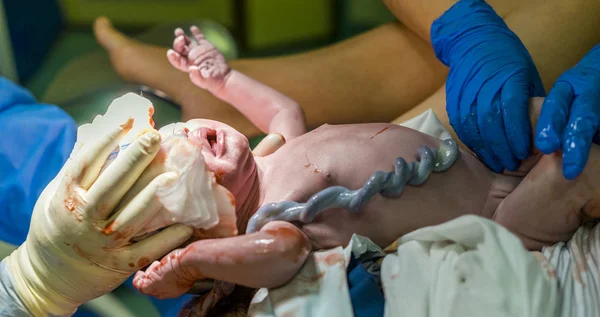Umbilical Cord Milking Deemed Safe for Preterm Infants Born After 28 Weeks, NIH Study Finds

A recent study funded by the National Institutes of Health (NIH) has revealed that umbilical cord milking, a procedure involving the gentle squeezing of the umbilical cord to transfer blood into a preterm infant’s abdomen, appears to be a safe and viable option for infants born after 28 weeks.
This finding offers a potentially faster and equally safe alternative to the standard practice of delayed cord clamping, particularly for preterm infants requiring immediate support. The study addresses previous concerns raised by a 2019 research effort regarding potential risks, demonstrating that the benefits of umbilical cord milking are applicable to infants born after 28 weeks.
The conventional practice of delaying cord clamping allows for the natural flow of blood from the umbilical cord to the infant’s body over a period of 30 to 180 seconds. In contrast, umbilical cord milking accomplishes the same outcome in approximately 20 seconds. This quicker procedure is especially valuable for infants requiring urgent assistance, such as respiratory support. Both methods ensure that umbilical cord blood reaches the infant before clamping, minimizing the risk of complications like anemia that can arise when immediate cord clamping occurs.
Study Details
Conducted by Dr. Anup Katheria of the Sharp Mary Birch Hospital for Women & Newborns in San Diego, in collaboration with researchers from the United States, Canada, and Europe, the study involved over 1,000 randomly assigned infants. The infants were divided into two groups, one undergoing umbilical cord milking and the other following the standard delayed cord clamping procedure. The study found that rates of severe intraventricular hemorrhage (bleeding inside the brain) and/or death were comparable between the two groups, each just over 1%. Additionally, overall rates of intraventricular hemorrhage were similar, around 12%. The research team plans to monitor the infants for two years to observe longer-term outcomes.
The NIH-supported study provides valuable insights into the safety and efficacy of umbilical cord milking for preterm infants born after 28 weeks. This alternative procedure not only ensures a swift response for infants in need of immediate support but also addresses concerns raised by previous research. With potential implications for neonatal care practices worldwide, these findings open avenues for further research and may contribute to refining protocols for the care of preterm infants. Dr. Nahida Chakhtoura, Chief of the NICHD Pregnancy and Perinatology Branch, is available for additional insights and commentary on the study’s implications. The study, titled “Umbilical Cord Milking versus Delayed Cord Clamping in Infants 28-32 weeks: A Randomized Trial,” was published in Pediatrics in 2023.





